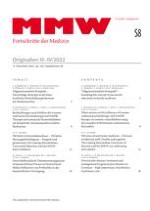Erschienen in:

13.12.2022 | Reizdarmsyndrom | FB_Originalie
Divertikelkrankheit: Patientenmanagement in hausärztlichen Praxen in Deutschland
Hoher Stellenwert von Probiotika in der hausärztlichen Versorgung
verfasst von:
Prof. Dr. med. Dr. rer. biol. hum. Manfred Gross, Dr. med. Udo E. Beckenbauer, Dr. rer. nat. Lena Bruder, Dr. rer. nat. Annette Zehrer
Erschienen in:
MMW - Fortschritte der Medizin
|
Sonderheft 8/2022
Einloggen, um Zugang zu erhalten
Zusammenfassung
Hintergrund: Die symptomatische unkomplizierte Divertikelkrankheit (SUDD) ist die häufigste Form der Divertikelkrankheit. Zur Therapie gibt es in den Leitlinien wenige evidenzbasierte Empfehlungen.
Methode: Im Rahmen einer deutschlandweiten Erhebung wurden 13.790 niedergelassene Ärztinnen und Ärzte (Allgemeinmedizin, Innere Medizin) zur Divertikelkrankheit befragt. Die Schwerpunkte lagen auf dem therapeutischen Management der Patienten und den persönlichen Erfahrungen mit den vorhandenen Therapieoptionen.
Ergebnisse: Insgesamt beteiligten sich 526 Ärztinnen und Ärzte an der Umfrage. Die größte Herausforderung bei der SUDD sehen die Ärzte in der konkreten Diagnosestellung (17%) und der Abgrenzung zum Reizdarmsyndrom (22%). Nur 6% fühlen sich über das Krankheitsbild ausreichend informiert. Von den Fachärzten erhalten die Hausärzte bei einem SUDD- oder Divertikulitis-Befund in 27% einen Therapieplan zur akuten Behandlung, in 11% bzw. 18% Empfehlungen zur Vor- oder Nachsorge bei Divertikulitis und in 4% Informationen zur Patientenaufklärung. Zur Primärprophylaxe bei Personen mit asymptomatischen Divertikeln empfehlen 41% der Hausärzte Ernährungsmaßnahmen, 37% Lebensstilanpassungen und 18% Probiotika. Nach einer akuten Divertikulitis empfehlen 42% Lebensstil- und Ernährungsmaßnahmen und 26% Probiotika. Bei der Behandlung von SUDD-Beschwerden setzen 45% der Hausärzte auf Lebensstil- und Ernährungsempfehlungen und 30% auf Probiotika. Mit der Wirkung von Probiotika sind 60% der Ärzte zufrieden, weitere 15% gaben an, damit noch keine Erfahrungen bei der Divertikelkrankheit zu haben. Die Gründe hierfür liegen vor allem in der fehlenden Erstattungsfähigkeit (31%), einer geringen Therapieadhärenz (20%) aufgrund des langsamen Wirkeintritts und der Schwierigkeit, ein geeignetes evidenzbasiertes Probiotikum auszuwählen (16%).
Schlussfolgerung: Im Praxisalltag ist die konkrete Diagnosestellung einer SUDD für die Ärzte eine große Herausforderung, die fachärztliche Unterstützung ist gering. Zur Behandlung werden häufig Lebensstil- und Ernährungsempfehlungen sowie Probiotika eingesetzt. Die Mehrzahl der Ärzte ist mit der Wirkung von Probiotika bei der chronischen Divertikelkrankheit zufrieden, auch wenn die Wahl eines evidenzbasierten Probiotikum eine Hürde darstellt.
Schlüsselwörter: Divertikelkrankheit, Divertikulitis, SUDD, Probiotika, Behandlung
Eingereicht am 24.06.2022 - Revision akzeptiert am 04.10.2022












